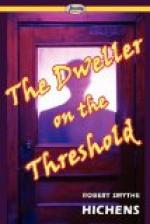“I beg your pardon. Your coming in surprised me. I had no idea”—his blue eyes went searchingly over Malling’s calm face—“that you could be here. I thought you and the rector were complete strangers till I introduced you yesterday.”
“So we were.”
Malling sat down comfortably on a sofa. His action evidently recalled Chichester’s mind to the fact that he was to see the rector.
“Isn’t the rector coming to see me?” he asked.
“Almost directly. He’s busy for a few minutes. We were smoking together in his study.”
“You seem to—you seem to have made great friends!” said Chichester, with a sort of forced jocularity.
“Great friends! They’re hardly made in a moment. I happened to be at church this morning—”
“At church—where?” exclaimed the curate.
“At St. Joseph’s. And Mr. Harding kindly asked me to lunch.”
“You were at church at St. Joseph’s this morning?” said Chichester.
He sat down by Malling and stared into his face.
“Did you—did you stay for the sermon?”
“Certainly. I came for the sermon. I had never heard Mr. Harding preach.”
“No? No? Well, what did you think of it? What did you think of it?”
The curate spoke nervously, and seemed to Malling to be regarding him with furtive anxiety.
“It was obvious that Mr. Harding wasn’t in good form this morning,” Malling said. “He explained the matter after lunch.”
“He explained the matter!” said Chichester, with a rising voice, in which there was an almost shrill note of suspicion.
“Yes. He told me he was often the victim of nervous dyspepsia, and that he had an attack of it while in the pulpit this morning.”
“He told you it was nervous dyspepsia!”
“I have just said so.”
The curate looked down.
“I advised him not to walk all the way home yesterday,” he said gloomily. “You heard me.”
“You think it was that?”
“He never will take advice from any one. That’s his—one of his great faults. Whatever he thinks, whatever he says, must be right. You, as a layman, probably have no idea how a certain type of clergyman loves authority.”
This remark struck Malling as in such singularly bad taste—considering where they were, and that one of them was Mr. Harding’s guest, the other his curate—that only his secret desire to make obscure things clear prevented him from resenting it.
“It is one of the curses of the Church,” continued Chichester, “this passion for authority, for ruling, for having all men under one’s feet as it were. If men would only listen, take advice, see themselves as they really are, how much finer, how much greater, they might become!”
“See themselves as others see them! Eh?” said Malling. “But do you mean that a rector should depend on his curate’s advice rather than on his own judgment?”




